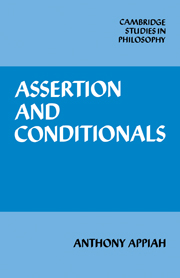1 - Cartesianism, behaviourism and the philosophical context
Published online by Cambridge University Press: 07 October 2011
Summary
I had even intended to ask your attention a little while on trust, and (as sometimes one contrives, in taking a friend to see a favourite piece of scenery) to hide what I wanted most to show with such imperfect cunning as I might, until we had unexpectedly reached the best point of view by winding paths. But … since I have heard it said by men practised in public address, that hearers are never so much fatigued as by the endeavour to follow a speaker who gives them no clue to his purposes – I will take off the slight mask at once.
(John Ruskin, 1865)AFTER BEHAVIOURISM
In the sixth of the Meditations on First Philosophy, which he published in 1641, Descartes expresses the core of the dominant philosophy of mind of the last three centuries:
from the mere fact that I know for certain that I exist and that I cannot see anything else that belongs necessarily to my nature or essence, except that I am a thinking thing, I rightly conclude that my essence consists in this alone: that I am a thinking thing, a substance whose whole nature or essence is to think … it is certain that this I, that is to say my soul, which makes me what I am, is entirely and truly distinct from my body, and can be or exist without it.
(1968: 156, translation slightly altered)- Type
- Chapter
- Information
- Assertion and Conditionals , pp. 1 - 8Publisher: Cambridge University PressPrint publication year: 1985



